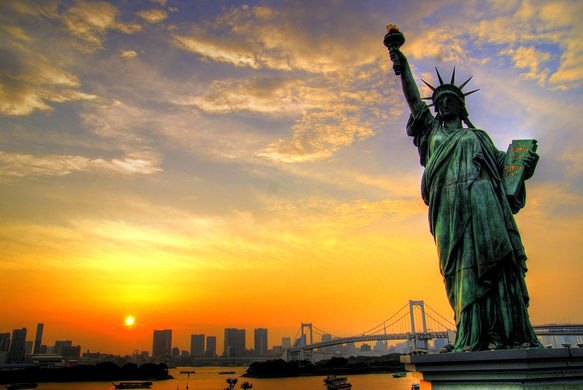A favorite argument on the left is that ‘there is no libertarian country on Earth,’ or, that ‘there is no free market society on Earth,’ Leftists will say these things, and then they will ask why, if nobody is using free market libertarianism, we should even discuss free market libertarianism.
The best responses to this common liberal argument are 1) it is a textbook example of the ‘No True Scotsman’ fallacy, and 2) it is impossible to name any country that has ever become wealthy where the dominant forces were not free market libertarianism. There may be no such thing as a true libertarian society, but people in countries that strive for libertarianism thrive. The same cannot be said for socialism.
 People are imperfect, and are incapable of living under any ideology at its most extreme, but that does not mean that all ideologies are equal. Socialists would have us believe that societies are stronger when the people work together for the common good, and yet no country has ever become wealthy through collectivist means – ever. Socialists would have us reject free market libertarianism even when no nation has ever become wealthy through any other means!
People are imperfect, and are incapable of living under any ideology at its most extreme, but that does not mean that all ideologies are equal. Socialists would have us believe that societies are stronger when the people work together for the common good, and yet no country has ever become wealthy through collectivist means – ever. Socialists would have us reject free market libertarianism even when no nation has ever become wealthy through any other means!
Socialists also use the ‘No True Scotsman’ fallacy whenever they try to show an example of socialism working in the real world. When socialism fails, liberals say, “That was not true socialism,” and when pressed for an example of socialism working, they’ll name the Scandinavian countries. Interestingly, the Scandinavian countries claim to be bastions of free market capitalism. Denmark’s Prime Minister, for example, acknowledges that Denmark has a generous welfare state, but he also says that Denmark would be unable to pay for it’s welfare were it not a free market, capitalist country.
Even with free markets, the Scandinavian countries struggle to afford their welfare structures, and our Democratic Socialists want to have generous welfare systems without using free market capitalism to pay for it. Think about that for a minute.
Never mind socialism. Let’s talk welfare for a bit. Is it possible to emerge as a wealthy nation, and then to stay wealthy under a welfare state? Socialists again point us to the Scandinavian countries, but even here the best argument socialists can make is that these welfare states have not collapsed yet. We know that there is a correlation between the homogeneity of a nation and the speed with which its economy falls apart under welfare, so it is hardly surprising that the least diverse nations on Earth would be doing better under welfare than have other nations that have tried the same things. We can, however, look at Venezuela to see welfare falling apart very quickly; France, Spain, and Italy to see it falling apart more slowly; Germany and England to see countries struggling not to become more like France, Spain, and Italy; and other examples, all over the world, of nations that have been destroyed by welfare. We can also see the Scandinavian cultures changing over time, as the younger generations are more apt to take advantage of welfare than were earlier generations.
The historical trends are undeniable to anyone who cares to look:
- Individualism works and Collectivism does not
- Free Market Dynamics work and Socialist Dynamics do not
- Nations that put Freedom over Equity find a High Degree of Both
- Nations that put Equity over Freedom find neither Equity, nor Freedom
- Generous Welfare Systems destroy the Incentive to Work
- Cultures Adapt to Incentives (and the more diverse a culture is, the more quickly it adapts)
What do our Democratic Socialists ask for? They ask for cultural diversity, generous welfare systems, and an end to free market capitalism. What could possibly go wrong?
There is nothing wrong with having a diverse culture without welfare, as a free people dependent upon their own productive capacities will share values, no matter how diverse their culture may otherwise be. Cultural diversity makes a nation stronger when that diversity revolves around shared cultural values, but when people begin to define themselves by what makes them different rather than by what makes them the same, diversity flips from being a glue that holds people together, to being a wedge that drives people apart.
There is also nothing wrong with having societal structures that alleviate suffering. We all want to alleviate suffering, but there is a big difference between helping people who are doing what they can to help themselves, and helping people who are not.
There is a huge difference between having good intentions, and achieving good results. Liberals spend too much time analyzing intentions. If they learned to analyze results, they would become conservatives. How many on the left look at the morality of systems. ‘Capitalism is not a moral system,’ they will say. People like Fidel Castro are then held up as moral leaders, with complete ignorance of the actual suffering such people have made flesh and blood human beings endure. Castro did not stop killing his own people until he died, and the same can be said of Mao, Stalin, Pol Pot, etc. etc. etc..
Looking for intent in a system is as absurd as is looking for intent in a rock. What matters are the intentions of people, and those intentions will manifest themselves in whatever system is in place. Under capitalism, the intentions of people will manifest themselves in economic activity, whereas under socialism, the intentions of people will manifest themselves in political activity.
Is political self interest somehow more noble than economic self interest? People working on their economic self interest will try to improve their positions by creating goods and services other people want. People working on their political self interest will try to improve their positions by banding together into identity groups, and petitioning government to give more to them at the expense of other people. Under both systems, people act in their personal self interest, but because of the different incentives in place, self interest manifests itself in very different ways: under free markets food waits for people, whereas under socialism people wait for food.
Is it more moral for food to wait for people, or for people to wait for food? Is it better to have a national epidemic of obesity, or a national epidemic of starvation? Since we know which system leads to what outcome, how can anyone claim to be both a socialist, and a moral person? A nation can fight obesity with education, but it can’t fight starvation without food…
There may be no such thing as a ‘true Scotsman,’ a ‘true Libertarian nation,’ a ‘true Free Market economy,’ or a ‘true Socialist nation,’ but there are about seven and a half billion true people. Perhaps rather than worrying about intent, we should worry about people, and should use systems that benefit flesh and blood human beings. Free market libertarianism is the only system that works, and nothing can argue that fact away.
As always, if you agree with our message, we ask you to help us by spreading the word, with the share buttons below.


























[…] These countries played with socialism and got burned, and have been successful only because they recognized socialism’s failures early enough to move away from it. Socialism has no success stories. It has failed everywhere it has been implemented, […]
Capitalism seems to simply refer to whom or what is utilizing the means of production which is the capital(whatever has the ability to be used in the production of the necessities and wants by the people under whatever type of society they may be living.) If they live under a ‘socialist State’ society then it would of course be the “State” utilizing the ‘capital’ in the operation under that system…thus the origination for the term State capitalism. If it were a ‘corporate State’ society the term Corporate capitalism might descriptively apply. The United States seems to have begun with a ‘free market capitalism’ largely operated by mercantilism, bankers and aristocrats of a landed gentry. So long as there was plenty of land to be developed as the population was increasing the ‘free market capitalism'(growing Middle class) seemed to provide economic opportunity for the people. Once the land was mostly owned, developed and limited…the original system began to morph into a combination of competitive capitalism increasingly regulated by growing government, which seemed to be a mixed economic system. Today it looks as though there is an increasing struggle between a long growing government(State capitalism) and the almost unnoticed increasing development of monopoly corporations(Corporate capitalism) as managed through Wall Street with increasing population aggravating the struggle.
Good observation. I would point out that big government bureaucracy loves big corporations. Why? because it is much easier to tax and control one mega-corporation than it is to tax, monitor, and control 10,000 small businesses. One large mega-corporation may have over 100,000 employees. Big corporations in turn have an oversized influence upon the election process with large campaign contributions and CEOs who love to virtue signal. Large corporations also have economies of scale when it comes to regulations with dedicated lawyers, compliance specialists, lobbyists who work directly with the regulators. Small companies cannot afford such capabilities. The big government and big corporation partnership is mutually beneficial.
Capital exists under any system, so i guess you could call communism ‘state capitalism’ if you want to, but using the word ‘capitalism’ To describe its opposite seems intentionally misleading.